When it comes to a Canada PR interview, preparedness is essential! This step is key to securing permanent residency status in this stunning North American country. This article covers tips and strategies to ace your interview. Let’s get started! Be familiar with the process. Understand the format, questions, and evaluation criteria. Knowing what to expect helps you prepare better and reduce nervousness.
Gather all the documents required. This includes your passport, educational certificates, work experience letters, language proficiency test results, and any other supporting documents mentioned in your application. Having these ready shows organization skills. Practice mock interviews. Ask a friend or family member to ask you common interview questions related to your Canadian immigration application. This hones your responses, articulation, and confidence.
Be professional during the real interview. Dress formally and arrive early. Be courteous and respectful. Make eye contact. Highlight your skills, qualifications, work experience, and achievements related to your field. Explain how these fit Canada’s economic needs or contribute to its multicultural society.
Research Canadian culture, values, economy, current affairs, and recent developments that may impact immigration policies or procedures. Showing interest in integrating into Canadian society pleases the interviewer.
Prem’s story is inspiring! He studied extensively about Canadian history and culture. His knowledge and enthusiasm impressed the interviewer, leading to a positive outcome for his application.
Preparing for the Interview
To prepare for a successful Canada PR interview, equip yourself with the necessary skills. Research the company and position, understand the interview process, and practice common interview questions. This will ensure you are well-prepared and confident when facing the interview panel.
Research the Company and Position
Researching a company and role before an interview is essential for success. Gather info about the company’s history, mission statement, and accomplishments. Also, explore their website and social media accounts.
Look carefully at the job description to find key requirements, skills, and preferred attributes. Then, research the industry trends and competitors. Stay updated on news, challenges, and innovations.
Seek advice from current or past employees. Have conversations about the work culture, team dynamics, and growth opportunities.
Finally, use all info to tailor your answers. Highlight how your skills fit their needs and show how you can help reach their goals. This level of preparedness will leave a lasting impression.
Also Read: Exams to Study in Australia: IELTS, TOEFL, PTE, GMAT, GRE, LSAT, etc, UG & PG Score Requirements
Understand the Interview Process
The interview process is essential for getting a job. It requires understanding the employer’s needs, presenting yourself well, and having a good chat. Research the company to know its values, culture, and goals. Answer common questions, emphasizing your skills and experiences. Dress suitable for the job’s dress code. Arrive early to show punctuality and lower stress. Make eye contact, plus use positive body language to show enthusiasm and confidence. Send a thank you note or email after the interview to show gratitude.
Different companies may have various interview styles. For example, panel interviews, behavioral-based questions, or multiple rounds of interviews. A friend of mine once interviewed for an impressive company. Despite his qualifications, he didn’t research the organization. He couldn’t explain why he wanted to work there. This mistake made him miss out on the job. It’s paramount to understand the interview process. By preparing, being professional, and showing real interest in the role and company, you increase your chance of scoring that job offer.
Practice Common Interview Questions
Preparing for a job interview can be really nerve-wracking. But, by rehearsing common interview questions, you can improve your confidence and up your chances of success.
- Practicing these questions helps you become familiar with the types of queries you could get in an interview. This way, you can craft structured answers that display your skills and experiences.
- It also aids in refining your communication skills. By rehearsing your responses, you can make sure you communicate your thoughts and ideas clearly.
- Moreover, practicing common interview questions gives you the chance to anticipate any hard or unexpected questions. This way, you can prepare suitable answers that show your ability to think quickly and handle tricky situations.
It’s important to remember that each interview is distinct and calls for tailored preparation. Do research about the company and understand their values and mission. This will help you modify your answers to their particular needs.
To make the most out of the interview, utilize the various resources such as online practice platforms or mock interviews with family and friends. Practicing and refining your answers continually will give you more confidence.
Don’t skip this important phase of the job search process. By spending time to practice common interview questions, you’ll be better ready to present your qualifications during the actual interview, helping you land the job!
Tips for a Successful Interview
To ensure a successful interview for your Canada PR, dress professionally and maintain proper body language. Demonstrate your knowledge and skills to impress the interviewer. Showcase cultural adaptability and communication skills as key strengths. Finally, highlight your qualifications and relevant experience to leave a lasting impression.
Dress Professionally and Maintain Proper Body Language
Dressing and body language are critical for a successful interview. They do affect the first impression you make on the employer. Here’s a guide to help you do it right:
- Dress properly: Pick an outfit that fits the company’s dress code and culture. Stick to formal clothing unless specified otherwise. Also, your clothes should be clean, fit well, and free of wrinkles.
- Grooming: Style your hair neatly and keep your nails clean and trimmed. Don’t use too much perfume or cologne. Hygiene is super important.
- Posture: Keep your shoulders back and don’t cross your arms. This shows confidence and professionalism. Sit up straight during the interview and don’t fidget.
- Use non-verbal communication: Make eye contact throughout the conversation. Smile when appropriate. Be conscious of your facial expressions – they show attentiveness or disinterest.
Body language speaks a lot about your personality. So, practice these tips to appear polished and professional.
Pro Tip: Before the interview, practice in front of a mirror or record yourself. This helps you be aware of any bad body language habits.
Demonstrate your Knowledge and Skills
Demonstrating your knowledge and skills during an interview is vital. It proves your qualifications and expertise in a competitive job market. Follow this step-by-step guide to effectively show off what you know:
- Research the company and position. Learn their goals, values, and exact requirements. Align your knowledge and skills with their needs.
- Highlight relevant experiences and accomplishments. Give examples of how you applied knowledge and skills in past roles. Show your practical abilities.
- Prepare answers to potential interview questions. Explain concepts and processes in a concise way. This proves not only knowledge, but communication skills too.
- Showcase any certifications or training you have completed. Demonstrate commitment to learning and professional growth.
- Listen to the interviewer’s questions. Answer them thoughtfully and directly. Engage in dialogue to prove competence and value.
Besides demonstrating knowledge and skills, be humble. Show confidence in what you know, and be open to learning from others.
Showcase your Cultural Adaptability and Communication Skills
Cultural adaptability and communication are must-haves for a successful interview. They prove you can get along with different cultures and communicate well. Here’s how to show them:
- Show interest: Research the company’s culture and values to show you’re willing to adapt. Use this knowledge in your answers.
- Mention experiences: Share times when you navigated cultural differences or worked in diverse teams. Show how your adaptability improved communication and collaboration.
- Show active listening: Keep eye contact, nod, and ask questions. This shows you value communication and are open to understanding others.
It’s important to do more than just standard interview skills. Show your cultural sensitivity, relevant experiences, and active listening skills and you’ll be seen as someone who does great in a variety of environments.
Before your next interview, think about the possibilities if you show your cultural adaptability and communication skills. Don’t let fear motivate you; instead, let the excitement of new experiences drive you. By embracing cultural diversity and mastering communication, you’ll impress employers and make lasting relationships. So, be yourself and make the most of this chance!
Highlight your Qualifications and Relevant Experience
Don’t be left behind! Shine in an interview by highlighting your qualifications and relevant experience. Employers are searching for someone with the right skills and knowledge to make a difference. Here are 4 key points to keep in mind:
- Keep it brief: Use bullet points to emphasize the important stuff.
- Give examples: Show how you’ve applied your skills and knowledge in the past.
- Be specific: Customize your answers to fit the job description.
- Transferable skills: Spotlight skills that are useful in different contexts.
It’s essential to stay authentic when talking about your achievements. Don’t exaggerate or make false claims, as they can easily be noticed. Make the most of this chance to show why you’re the ideal candidate. Prepare well and make a lasting impression.
Handling Difficult Questions
To handle difficult questions in a Canada PR interview with finesse, equip yourself with the right strategies. Be prepared for tough questions, remain calm and confident, and provide honest and thoughtful responses. These sub-sections will guide you in navigating through challenging queries effectively.
Being Prepared for Tough Questions
It’s a must to prepare for hard questions in any work setting. This lets people answer difficult queries confidently and effectively. Here are 6 points to help you manage tough questions:
- First, think about the topic, audience, and context to predict potential hard questions.
- Second, gather info and data to back your answers.
- Third, listen actively and make sure you understand the question.
- Fourth, stay calm when faced with hard queries. Pause to collect your thoughts before responding.
- Fifth, give brief answers that address the question without going astray.
- Finally, keep a positive attitude. Face hard questions as opportunities for growth, not problems.
To excel in handling difficult questions, remember a few extra details. Use the questioner’s name, make eye contact to build rapport, and show sympathy for their worries. These small actions can go a long way in creating trust and credibility.
President Abraham Lincoln’s is a great example of the importance of preparing for hard questions. Despite giving a well-known speech that has lasted for years, he faced plenty of difficult queries during his presidency. By getting ready for his answers and tackling critics, he showed how being ready for hard questions can lead to powerful communication.
Remaining Calm and Confident:
Remaining composed and believing in one’s skills is essential to answer difficult questions with ease. It is important to be prepared, knowledgeable and practice active listening. Difficult questions can arise from various perspectives and potential contradictions. Therefore, it is important to engage with the questioner respectfully and provide clear answers.
Developing communication skills is also important. This includes actively listening, taking a moment to reflect before responding and structuring the answer logically.
A Harvard Business Review (HBR) study revealed that successful professionals who stay calm and confident in challenging questioning situations, are better equipped to navigate tough conversations, win over their audience and build credibility within their respective fields.
Also Read: Provincial Nominee Programs PNPs for Canada PR
Providing Honest and Thoughtful Responses
When faced with a hard query, it’s essential to pause and collect your thoughts. That way, you can provide a considered response instead of an impulsive reaction. Listening actively is also important, to grasp the question’s nuances and respond accordingly. If you hear what the person is asking, and recognize their worries, you can give a more meaningful answer.
Offering sympathy and understanding is also useful. Acknowledging the emotions behind these questions builds a space where people feel heard and respected. Responding kindly implies that you cherish their perspective and are committed to finding solutions.
Instead of seeing difficult queries as aggressive, reframe them into constructive conversations. This helps both parties to explore different standpoints without hostility.
And, don’t forget: giving honest and thoughtful replies doesn’t mean sacrificing your values or convictions. It means expressing your viewpoint politely, while still valuing others’. Mutual respect is key for successful conversations, even when discussing tricky topics.
Conclusion
In conclusion, the Canada PR interview is an important step in immigration. Using the tips from this article, your chances of success are increased. There are more tips though!
- Research the culture and values of Canada to show commitment.
- Show proficiency in both English and French.
- Have all documents ready to show responsibility.
- Have a positive attitude and show enthusiasm for Canada; this will leave a good impression.
All these tips work together to make you the ideal candidate for permanent residency. With these tips, your dream of living in Canada can come true!
Frequently Asked Questions
Q. How should I dress for a Canada PR interview?
It is important to dress professionally for a Canada PR interview. It is recommended to wear formal attire such as a suit or a business dress. This demonstrates your seriousness and professionalism towards the interview.
Q. What documents should I bring to the Canada PR interview?
It is crucial to bring all the required documents for your Canada PR interview. This includes your passport, copies of your educational qualifications, work experience letters, reference letters, proof of language proficiency, and any other supporting documents mentioned in the interview invitation.
Q. How can I prepare for a Canada PR interview?
To prepare for a Canada PR interview, you should research and gather information about Canada’s immigration policies, your chosen province, and its cultural aspects. It is also important to practice interview questions related to your educational background, work experience, and the reasons behind your desire to settle in Canada.
Q. What are some common interview questions asked during a Canada PR interview?
During a Canada PR interview, you might be asked questions about your education, work experience, language proficiency, adaptability, reasons for choosing Canada, and your plans for settling in the country. It is essential to be well-prepared and provide honest and concise answers.
Q. How can I demonstrate my adaptability during a Canada PR interview?
During your Canada PR interview, you can demonstrate adaptability by emphasizing your past experiences of successfully adjusting to new environments, cultures, and work settings. Highlight any international work experience, travel experiences, or instances where you faced and overcame challenges.
Q. What should I do after a Canada PR interview?
After a Canada PR interview, you should thank the interviewer for their time and express your continued interest in becoming a permanent resident of Canada. It is important to wait for the official decision and not contact the immigration authorities unless requested. Stay patient and positive throughout the waiting period.




